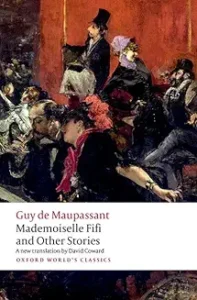Mademoiselle Fifi and Other Stories by Guy de Maupassant 1882
Maupassant (1850-1893) is considered by most to be the father of the modern short story. In his short life, he wrote 300 short stories, six novels, and three travel books, often turning out 2-3 volumes per year. Under the tutelage of Flaubert, a family friend, and Zola, who gave his eulogy, Maupassant was enormously popular during his lifetime. He is considered a leader of the Naturalist school.
This volume contains 20 of his best known stories in a new translation and with an informative introduction by David Coward, a professor of French at Leeds University. These are stories in two senses, first there is the basic plot and second, the technique of introducing the story as part of a conversation between two characters or a narrator. The stories themselves are wonderful, often tensely unfolding with a surprise, abrupt, and wholly believable ending. Within the first page or two, I was totally engaged and eagerly turned the pages to discover what happened to the characters. There was not a single dud among the 20.
There were a couple of ‘horror’ stories where strange and inexplicable things happened . In ‘Who Can Tell’ a man returns to his home late at night and hears a fearsome clatter as all the furniture ‘walks out’ only to appear in an antique shop in a distant city and then reappear in his house. The story is being told by the man to his psychiatrist at the rest home where he has been living. Psychiatry fascinated Maupassant!, but most of the stories are more realistic tales. A sense of pessimism, cynicism, and a harsh and merciless view of the world permeates the stories, but it doesn’t prevent them from being gems, small and intricate insights into the human condition.
Sadly, the author probably contracted syphillis at a young age, and in his 40’s he descended into madness and died at 43. Zola eulogized the man who wrote his own epitaph: “I have coveted everything and taken pleasure in nothing.”
I had never read du Maupassant, and having taken the occasion of our time in Paris to do so, I’m grateful I did. This is a good volume to keep on your night table and dip into before sleep whenever you want a distraction.



